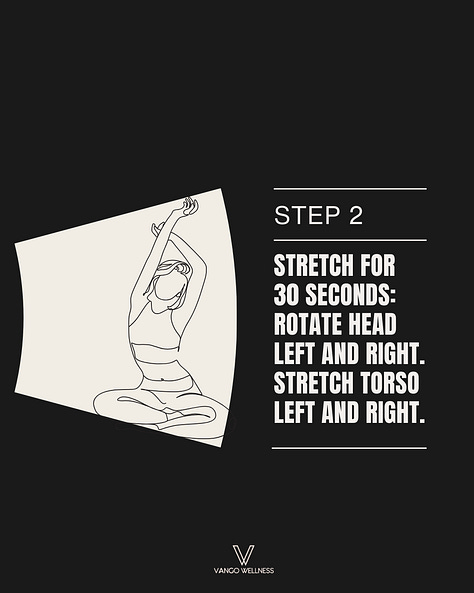The Power of a Morning Routine: Small Habits, Big Impact
Mornings set the tone for the rest of the day.
The way you start your day can influence your energy levels, focus, mood, and overall well-being. Yet, too often, we rush into the day, reaching for our phones, checking emails, or jumping straight into responsibilities without giving ourselves time to reset and prepare mentally and physically.
But what if you took just one minute each morning to be intentional about how you start your day?
At Vango Wellness, wellness isn’t about drastic changes or chasing the latest trend—it’s about small, sustainable habits that compound over time. The good news? You don’t need to overhaul your entire routine to feel better. Just one minute can make a difference.
Here’s a simple yet powerful 3-step morning practice to help you wake up feeling refreshed, centered, and ready to take on the day.
1-Minute Morning Wellness Routine
Step 1: Wake Up & Take 3 Deep Breaths
Before reaching for your phone or jumping out of bed, pause and take three deep breaths. This simple practice:
✅ Activates your parasympathetic nervous system, reducing morning cortisol spikes (your body’s stress response).
✅ Increases oxygen flow, waking up your brain and body.
✅ Promotes mindfulness, setting a calm and intentional tone for the day.
A study published in Frontiers in Psychology found that controlled deep breathing can lower stress and improve emotional regulation, making it an excellent tool for starting your day with clarity1.
Step 2: Stretch for 30 Seconds
After deep breathing, take just 30 seconds to stretch and release overnight stiffness:
🔹 Neck rotation: Gently rotate your head left and right to ease tension.
🔹 Torso stretch: Stretch your torso left and right to wake up your spine.
Why it matters: Your body has been inactive for hours during sleep, and a quick stretch improves circulation, relieves tension, and increases flexibility. Studies suggest that morning stretching enhances blood flow to the brain, improving cognitive function and energy levels2.
Step 3: Hydrate First – Water or Lemon Water Before Coffee/Tea
Before reaching for coffee or tea, hydrate first. After hours of sleep, your body is naturally dehydrated, and replenishing fluids first thing in the morning can:
✅ Boost metabolism – Studies show that drinking water upon waking can increase metabolic rate by 30% (Journal of Clinical Endocrinology & Metabolism).
✅ Improve digestion – Hydration kickstarts your digestive system, preventing bloating and sluggishness.
✅ Support brain function – Dehydration is linked to fatigue, poor concentration, and mood fluctuations3.
Why consider lemon water instead?
Adding lemon to your water offers additional benefits:
🍋 Vitamin C boost – Supports immune function and skin health.
🍋 Aids digestion – Lemon stimulates bile production, improving digestion and reducing bloating.
🍋 Kidney stone prevention – The citric acid in lemons may reduce the risk of kidney stones by increasing urine volume.
Whether you choose plain water or lemon water, prioritizing hydration before caffeine ensures that your body starts the day in a state of balance and renewal.



Why Small Morning Habits Matter
This 1-minute morning wellness routine may seem simple, but it rewires your body and mind for success. Instead of rushing into the day feeling scattered or reactive, you’re intentional, energized, and in control.
At Vango Wellness, I coach clients on building sustainable habits that support long-term health and vitality. Wellness isn’t about big, overwhelming changes—it’s about stacking small, effective habits that create real impact over time.
✅ Deep breaths help regulate stress and boost oxygen flow.
✅ Stretching wakes up the body and improves circulation.
✅ Hydration supports digestion, metabolism, and mental clarity.
And all of this takes just one minute.
So, tomorrow morning, before you check your phone or rush into your to-do list, try this simple practice—because small habits lead to big change. 💛
https://www.frontiersin.org/journals/psychology/articles/10.3389/fpsyg.2017.00874/full
https://www.health.harvard.edu/staying-healthy/the-truth-about-stretching
https://pmc.ncbi.nlm.nih.gov/articles/PMC4207053/




